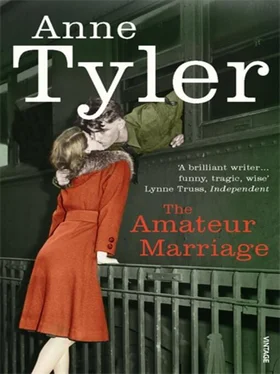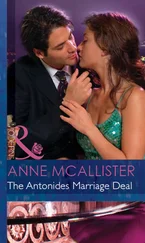“Not this particular one,” he said. “I had to guess from the shape alone, and obviously I flunked. So what do I do now? Help! I find myself in the throes of a culinary emergency!”
She laughed. Suddenly the world looked less serious, less important. Ground beef and Elmview Acres and domestic life in general were just… comical, in fact. She said, “Well, of course you could always have hamburgers.”
“The last time I made hamburgers, they kept falling through the grate,” he said. “Adelaide was ready to kill me. We had company and there I was, serving up these little charred bits of meat that I’d risked third-degree burns for plucking them from the fire. ‘Here, folks, have some Beef Crumbs Flambé.’”
“‘Some Burgers Carbonisé,’” Pauline suggested, gargling her r the way she’d been taught in French I. Alex laughed, which gave her a flush of gratification. She said, “How about meat loaf, then?”
“Well, I thought about meat loaf…”
“I know that sounds kind of humdrum, but I have the best recipe! Meat Loaf Orientale, it’s called. You just take any normal meat-loaf recipe from one of Adelaide’s cookbooks, Better Homes & Gardens or some such, and you stir in a can of chop suey vegetables and half a can of chow mein noodles. It’s delicious.”
“Wait a minute; I’m writing this down. Chop suey vegetables…”
“But drain them first,” she said. It was fun to feel like an expert at something.
“Chow mein noodles…”
“And what I do myself, I lay a sheet of foil across the pan when the meat starts to brown. I hate a meat loaf that’s too brown and crusty on top.”
“Sheet of foil…” Alex repeated. “Gee, thanks, Pauline. I knew you’d come to my rescue.”
“Any time,” she told him. “Hope it works out!”
Then they said goodbye and she hung up.
After that, it took no more than an instant to settle on what to wear. She slipped on a full white skirt and zipped the zipper, stepped into a pair of medium-heeled pumps, and grabbed her purse from the amoeba-shaped plastic chair in the corner. “I’m off,” she told Michael as she passed through the kitchen. He was playing Go Fish at the kitchen table with George and Lindy. Karen, who had just awakened from her nap, sat on his lap, sucking her thumb and dreamily twining a curl around one chubby index finger. Pauline said, “There are cookies for the kids in the cookie jar, and chocolate milk in the fridge if they want it.”
“Who was that on the phone?” Michael asked.
“Phone?”
“The telephone.”
“Oh. Well. That was Wanda.”
“Wanda! You’re just about to see her in person!”
“So?”
“You were talking to her for ages!”
“You know how women are,” Pauline said, and she gave him a breezy wave and walked out.
Their car was a 1940 Dodge Special — a dull-black, turtle-shaped model inherited from her father when he moved up to a pale-pink Deluxe after the war. Michael hadn’t even known how to drive when they got it. Pauline had had to teach him. He’d been almost too good a student. Now any time she drove him to work he found fault with her gear shifting or wondered aloud why she revved the engine so hard. After she had shot backwards into the street and braked a little too sharply, not having noticed an approaching station wagon until it honked, she winced and glanced toward the house. But Michael must not have heard, because he didn’t appear at the window.
She meandered through the curving streets of Elmview Acres and out the gate, took a wrong turn, corrected herself, and eventually ended up on Loch Raven, where she could settle behind a bus and relax into a daydream. Alex Barrow’s broad face, with the roughened skin that gave him an air of experience. His powerful, packed, wrestler’s body. The thick black fur at the base of his throat. It was wrong to call him handsome, although all the women did. Really he was almost ugly, but in a stirring, thrilling way that made her shift in her seat as she thought about him.
Last Christmastime, she and Michael had attended a dinner party so large that their hostess had had to rent an extra table for the dining room. Married couples were separated, the wife at one table and the husband at the other, and it so happened that Alex had been seated next to Pauline. Partway through the dinner, he leaned toward her and asked if she’d noticed that theirs was the frivolous table. “Frivolous?” she repeated, and he said, “Yes, our table’s telling jokes, but the other one’s talking politics. They’re the sober half of these marriages and we’re the jolly half.”
It was true, she saw. Jack Casper, on her left, was in the midst of a very funny story about his three-year-old’s visit to Santa, while his wife at the other table was attacking the Israeli Parliament’s relocation to Jerusalem. When their own table erupted in laughter at the punch line of Jack’s story, Alex told Pauline, “See?” and of course everybody wanted to know, “See what?”
He said, “We’re the fun-loving ones. The other table’s the responsible ones, the ones who balance the household accounts and tell us we can’t afford that vacation trip we wanted.”
Then the other table got wind of the discussion and joined in — Jack’s wife protesting that they were fun-loving too; just because they’d been speaking seriously didn’t mean they weren’t. “But after all,” she pointed out, “certain things are more important than fun, you have to admit.”
Alex said, “They are?”
“I mean, you’ve got to accept reality.”
“Reality!” Alex echoed in horror, and Jack Casper leapt to his feet, shouting, “Never! Never!” and pumped both fists in the air above his head. The rest of their table cheered and clapped, while the other table watched blankly.
Was that when Alex Barrow began to occupy Pauline’s thoughts?
Oops. Somehow, she had arrived downtown. She should have taken a left back there. And the next street she came to had a sign reading No Left Turn; so she took a right instead. Then a left after that. But now where was she? She seemed to have gotten confused.
After another left, though, the scenery grew more familiar. She entered a hodgepodge of stores and houses, the stores’ signs often Greek or Polish or Czech, the houses’ stoops scrubbed white as soap bars and their parlor windows displaying artificial flowers, dolls dressed in native costumes, plaster Madonnas with their arms outstretched in blessing. Black-garbed, kerchiefed old women plodded down the sidewalks laden with knobby shopping bags. Little girls played hopscotch or jacks; older girls in spaghetti-strapped sundresses sashayed past groups of teenaged boys and pretended not to hear their whistles.
Pauline had been right to urge Michael to leave this place. Life here was so jumbled, so gnarled and knotted and entangled.
The canasta party was at Katie Vilna’s. It always was, because Katie was a divorcee — the only one of them free to have her girlfriends over any time she liked without a husband’s barging in. She and her son lived in the apartment where she had grown up, above Golka’s Barber Shop. As Pauline was maneuvering her car into a very obstinate parking space out front, she saw Wanda and her sister-in-law, Marilyn Bryk, walking toward her. She tapped her horn and they stopped to wait for her — Wanda square-hipped and dowdy in a flowered dress with cap sleeves, Marilyn (a New Jersey girl) more fashionable in a bouffant-skirted shirtwaist. “Okay, you’re almost in,” Wanda called. “Just swing her to the left a bit… back, back… whoa!”
Pauline cut the engine and stepped out of the car, leaving all her windows open because it was so much hotter here. “Hi, there!” she said. “Don’t you look cute in that hairdo, Marilyn!” (She was speaking from a protective impulse, because actually Marilyn’s hairdo — a tightly curled, skull-hugging poodle cut — made her face seem too big.) Each woman set an arm around Pauline in a brief embrace, and then the three of them entered the door to the right of the barber’s.
Читать дальше












